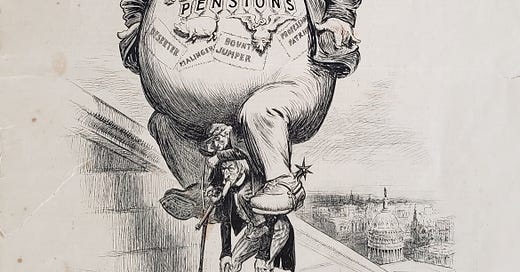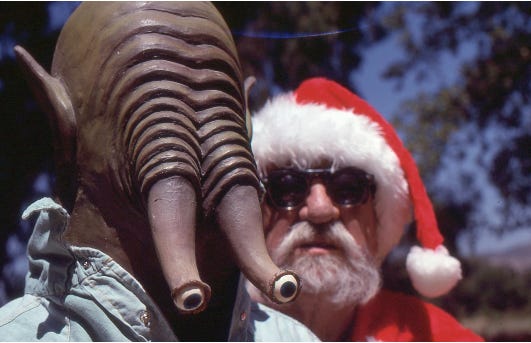EMERALD CITIES (1983)--Our job is to IDENTIFY PEOPLE LIKE THIS (1898), and CHASE THEM AWAY! Merry Christmas!
https://bynwr.com/videos/emerald-cities
SEE EMERALD CITIES (Free)/4k resolution restored) HERE:
https://bynwr.com/videos/emerald-cities
————
MOVIE MUSIC on YOUTUBE (click below):
Song by THE MUTANTS (a “Nuclear” Xmas)
Song by FLIPPER (“Love Canal”)
————-
DICK RICHARDSON (MASK) AND ED NYLUND/SANTA. ©1983 L.L. PRODUCTIONS.
REVIEWS FROM LETTERBOXD
★★★★ Watched by Graham Williamson 27 Aug 2019
I suppose it's always the way with cult movies that you're either going to love 'em or hate 'em, but even so I was astonished at this juncture to find that one of Nicolas Winding Refn's ByNWR restorations is actually, genuinely good! I'd have settled for "not shit", but this is something I enjoyed!
Emerald Cities is what Repo Man might have been had Alex Cox not inexplicably managed to secure studio backing for it, allowing him to hire a world-class cinematographer, a solid cast, enough money to put together some decent car chases and workable special effects... I realise I'm making Repo Man sound like a Bond movie here, but compared to Emerald Cities it is. This is pure scuzz satire, its slender quest narrative interrupted by enjoyable bargain-basement hardcore by Flipper and The Mutants, as well as (fake?) vox pop interviews and nightmare newsreels about Cold War nuclear proliferation and ballooning government debt.
One of these montages even includes the 'riding the bomb' scene from Dr. Strangelove, which would be unbelievable hubris were it not for the fact that Richard R. Schmidt's film does manage a similar balance of nihilistic humour and steely, serious moral anger at the prospect of nuclear war. It begins in Death Valley and it ends with a pointless death, and in between no fragment of optimism emerges. It's never a downer, though, largely because of the animating force of its sheer anger. It strikes me as a model of film-making that not only could be revived to deal with the current climate crisis, it actively should.
Schmidt has a terrific eye for weird side characters, like the guy who delays Ed Nylund's drunken anti-hero with a long reminiscence about his student drama career, and there are some terrific one-liners. (I love the presidential candidate who vows to cancel the space program: "Let them come to us!") Having compared it to two of my all-time favourite films I must acknowledge that it falls short in a lot of ways, most obviously the cast. Nylund and Carolyn Zaremba are good as the leads, but as an actor Flipper lead singer Ted Falconi makes a good, uh, yeller. Still, the gap between what this film wants to be and what it actually achieves is far, far shorter than it has any right to be.
ED NYLUND/SANTA. ©1983 L.L. PRODUCTIONS.
★★★½ Watched by louferrigno 21 Sep 2021
Several filmmakers resist the urge of the mainstream Hollywood market, preferring to work in complete independence without fear of their work getting cut up by schlubs in it for a quick buck and in doing so explore new artistic territories, all with the risks that come with having to film from the money out your pocket. Rick Schmidt, a Arizona native who drifted towards filmmaking in California's Bay Area by happenstance, quite literally wrote the book on the struggles and important tips one needs to learn when working without a major studio (hell, he wrote TWO books, one in 1988, the other in 2004), and he learned many of them the hard way as he slowly constructed his first three films in the span of a decade, united by several common cast members and thematically exploring personalities and worlds on the brink of falling apart. A Man, a Woman, and a Killer observed the fragile bonds of lovers (co-directed by Schmidt's roommate Wayne Wang who, unlike Rick, decided to give Hollywood a try), 1988: The Musical zeroed in on a dying man's aspirations for show business, and Emerald Cities analyzed society's fears of apocalypse in the Reagan 80's, achieving it with a ragtag sense of inevitability and taking pristine snapshots of the cultural zeitgeist of the world, California, and those still trying to find hope that an idealized form of the American Dream is attainable when collapse seems near.
Christmas 1983, a time devoid of jolliness or enthusiasm from the public as nuclear war is constantly threatened and Orwell's vision of the year 1984 is no longer a far-off possibility. Incorporating a lot of fly-on-the-wall news broadcasts, improvised interviews, and assorted found footage, Schmidt acknowledges America's willingness to throw itself towards oblivion, the endless costs in funding war machines for the Cold War, the inability to learn our lesson after Hiroshima's devastating impact on a section of humanity, and criticizes through simple reflection the mainstream media's endless hopelessness and perpetuation of doomsday. Through this the nature of Christmas as a time of innocence and merriment is completely shot down, many of the adults asked about Santa Claus inadvertently demonstrating the futility of fantasy at its purist when reality could cause a missile to destroy the entire country, and Schmidt documents America's paranoia and dread in response to a president oblivious to the fact that no-one is "good" for racing towards a nuclear crisis. Nobody wants to celebrate Christmas at ground zero, but Schmidt subjects us to the concerns of that reality when the only thing the news can talk about are the MX missiles that promise nothing but apocalypse.
The crux of the film lies in the two characters and the two bands we end up following/seeing in-between the video collages, opting to try and find life, purpose, and some sort of response to the global shitshow. Z wants more in life, or at least wants to see more than what the green-tinted TV tells her is life, and finds solace in hitting the road towards San Francisco thanks to the wayward car driven by Ted Falconi (Flipper), attempting to push away from the hopelessness on TV and see the fallout herself. Her father, Ed, sees hope in the emerald-tinted vision of the world he sees on his TV, trying to hitch rides to find his daughter again, donning his Santa costume as a reflection of the yearly job (AKA the two days of the year he's not allowed to drink beer, which frankly doesn't really stop him) he has as an impersonator as well as becoming a representative of the last glimmers of hope in America, the last spark of dreams and yearnings for peace that's become an outlier of optimism in a world trained by cynicism. As Ed's pursuit also shows signs of crumbling, two punk bands channel the world's anger as their lyrics get printed on-screen as a sort of mutual mantra between the young and frustrated, The Mutants offering upbeat numbers about the world's self-admittance to damnation while Flipper downtunes the mood in grungy noise-punk and being upfront in the nuclear warfare's massive ability to make all people and institution cease to exist. All of these little side-stories offer direct, personal accounts within a world tearing itself apart, contrasting and pairing with each other until the film itself breaks down order and pushes closer towards the world's central mood.
It's almost miraculous that Emerald Cities works as well as it does, it uses narrative incoherence to actually support the themes of the movie, and the extensive TV footage that takes up half the film, while still probably being too much at times, offer compelling insights and perspective of the world and America from 1980 to 1983. Schmidt blurs the line between reality and fiction with the same roguish intent as his musical peers, and manages to fine-tune itself into a ordered chaos, a daring feat given the extensive amount of improvisation used (like Ed's heartbreaking attempt to find comfort in nostalgia in front of a silent pair of elderly Mormons) and spur-of-the-moment solutions to pretty major changes outside his control (I won't go into detail, but it is pretty endearing seeing Schmidt being open and upfront about a cost-cutting trick most low-budget filmmakers would badly attempt and hope the audience doesn't notice). It should be noted that this is one of the films restored and released via the ByNWR service, which is something that's severely disappointed me eight films in a row, so color me surprised that it's managed to pull something forgotten from the world that's not softcore tits, is actually somewhat socially relevant and reflects an honest-to-good true perspective of its times, and is genuinely pretty good (making it one of 3 films out of 18 so far that's actually gained that sentiment, yeah, again, this is why I usually take long gaps in-between watching the service's films). A bonafide flash of inspiration and a cathartic watch, in a cosmic sort of way.
—————-
See ‘FEATURE FILMMAKING AT USED-CAR PRICES, THE MOVIE.” Preview/Teaser HERE. PASSWORD rickdoc
–––––––










Reading those great reviews reminds me, again, how grateful I am to have been, along with my family, a part of the improvaganza that is your Art. What a gift! Speaking of wihich, Merry Christmas to you and Julie!
woke today thinking of people society's gubbaments forcing their strange beliefs on others grateful for as my body ages I get more ok with the reality these fruitcakes and their systems and society been calling me and people I love weird all these years while espousing rather strange unlikely and many other possible terms are really really weird dwere not the ones who is weird...not like they say....but eff it enjoy any darn way